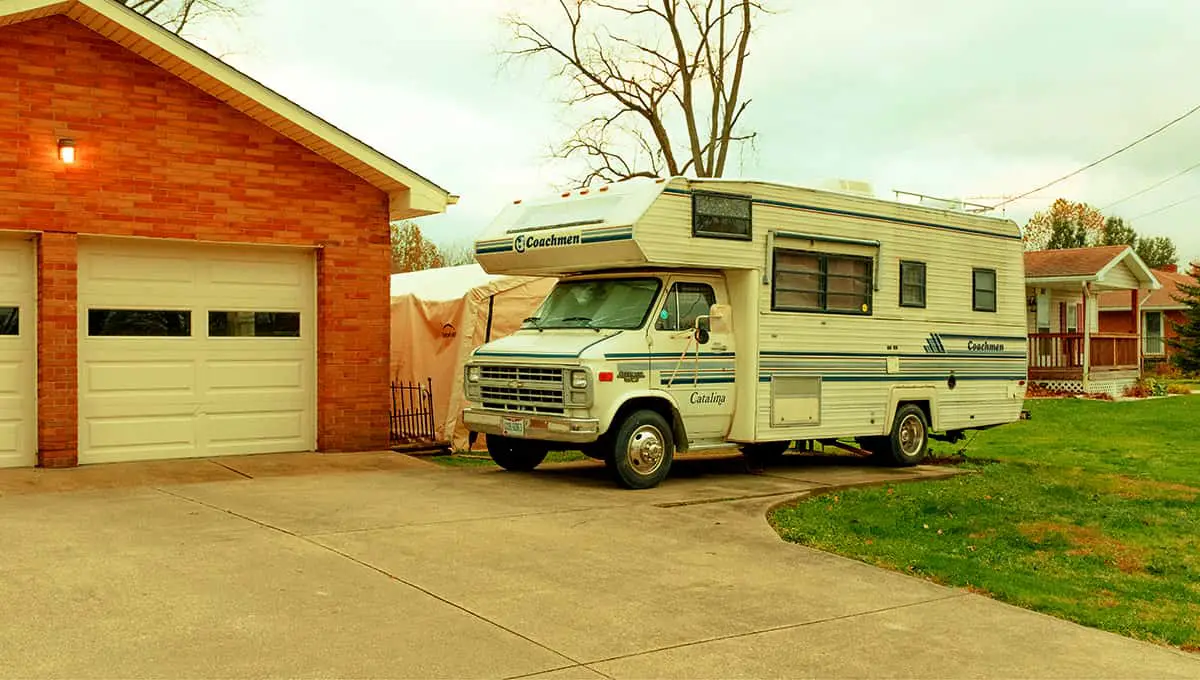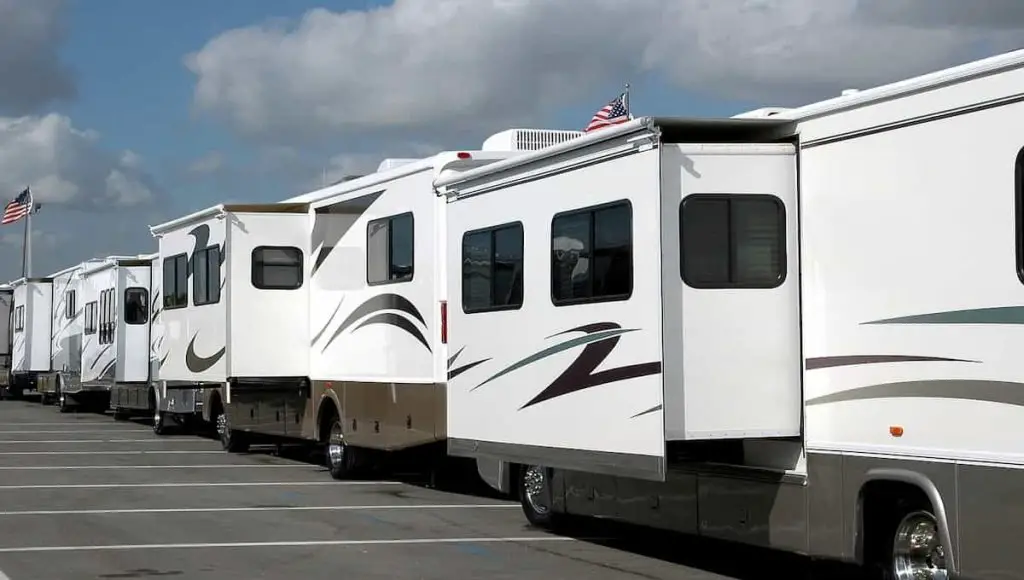Can I Live In an RV on My Own Property?

The nomadic lifestyle of cruising around in a campervan might be the dream of many. However, some people have parked their RVs in their driveways with no intention of going anywhere. The question on everyone’s lips is “can I live in an RV on my own property without facing potential legal repercussions?”.
There is no straightforward yes or no answer to this question because what’s regarded as legal in one state is unlawful in another. This article takes a closer look at the RV way of life, including the bylaws that govern it and why people choose to reside in these kinds of miniature homes in the first place.
Can You Live in an RV Legally?
Most people start living in motorhomes for a variety of reasons, but mainly because it’s more affordable and provides a simpler way of living to its residents.
That said, it’s in your best interest to understand the local laws first before you make any life-changing decisions, like going out and buying your first motorhome.
Why Can’t You Live In A Camper On Your Own Land?
It’s a fair question to ask. Unfortunately, it doesn’t matter if you own your property or plot of land, there may be laws that prohibit you from doing so. Taking up residence in your backyard is technically not allowed because of how they are classified under the Department of Housing and Urban Development code.
RVs, campervans, or motorhomes, whatever you prefer calling them, are regarded as vehicles that are used for recreational purposes, namely for camping and travel, rather than a place that Americans call home.
Are There Exceptions Where You Can Live in a Camper Without Coming Up Against the Law?
An overwhelming majority of RV-dwellers carry on life unimpeded by these legalities. In some counties, these regulations aren’t strictly enforced by local lawmakers.
However, all it takes is one complaint from an angry neighbor, and you could lose your mobile home or be forced to sell it.
If you do decide to carry on living on your property despite the logistics involved, perform due diligence by looking up the zoning rules about RVs where you live.
These zoning rules include everything about housing in general and not just about RVs, from sanitation to issues with neighbors, so be sure to read everything carefully and be informed when skeptical or unhappy neighbors come knocking.
These rules might be complicated because, in specific areas, such as cities and urban spaces, RVs are prohibited from being used for permanent dwellings. However, don’t give up on the RV fantasy yet, there may be towns or remote areas nearby where the regulations are laxer.
How to Be a Responsible RV Owner and Dweller
To remain living in your campervan in your backyard, you need to establish good relationships with your neighbors and the Homeowners Association by being a responsible RV owner, which means living cleanly, safely, and respecting other people’s spaces.
Connect Your Utilities
Living in your RV is not just a legal issue, but it can also be a health and sanitation hazard if you’re living without a proper sewerage system, running water, or electricity.
Ask yourself the following questions to determine whether your plot of land is RV-friendly:
- Is there access to potable water and electricity?
- Does the land support a septic system?
- Are there connections for water and sewerage?
Connect your utilities. Otherwise, you’ll just be seen as camping, which might cause the people next door to run to the authorities.
Who Are the Homeowners Association, and How Do I Get Their Permission to Live on My Land?
The Homeowners Association or HA creates the rules to preserve the community way of life, and that includes whether RVs are allowed and where on the property they’re allowed.
Whether you’re granted permission depends on the size of your RV. For example, Class A RVs are generally the size of a charter bus and for obvious reasons, aren’t allowed to be parked outside your home.
However, if you own a class B or C vehicle, which are smaller and around the size of a standard van, you may be granted permission to park the motorhome in your driveway or property.
The HA regards the community’s opinion highly, so it’s always a good idea for you to be neighborly, which means being quiet and keeping the peace.
You should also check first with your neighbors about how they feel about the campervan lifestyle before you go out and purchase one. You don’t want to be engaging in continuous disputes over blocking their views in the future.
Can Someone Live in an RV on My Property?
There are no laws against having guests in your RV, but their stay can only be a temporary one that spans weeks. Any longer than that and your neighbors might report you, and you may be unknowingly classified as a rule-breaker in certain areas.
Where Can I Live in My RV if Not on My Property?

If you’ve tried to live on your land in an RV, but HA and laws of the town have ruled it impermissible, you’ll have to start thinking about your next step, which is either selling the vehicle or possibly relocating.
If you refuse to give up your campervan, you might want to move to where RV-living is allowed. For example, buy a plot of land in a state that allows for this kind of dwelling. If you choose this route, ensure that the area is populated and provides the bare essentials, such as electricity, water, and so forth. You don’t want to be left somewhere remote, vulnerable to thieves, and without access to clean water.
Van life has become popularized in the wake of the housing crisis in America. People are choosing to sell their home, relinquish their mortgage, and give up their stuff for a life they can afford with fewer bills, hassles, and more opportunities to save for their futures.
Unfortunately, as dreamy and spontaneous as it might sound, you can’t park your RV anywhere. To avoid getting into trouble with the law, you need to learn the ins and outs’ of where you can and can’t camp and park your home on wheels.
RV Parks are cropping up all over America, where people who have opted for the wandering way of life or, rather, are forced into it due to homelessness or exorbitant rental prices are taking up permanent residence.
However, before you set up camp for the long haul, it’s important to remember that while thousands-upon-thousands regard RV parks as their forever home base, it’s a violation in the eyes of the law. Technically speaking, RV-owners should only be permitted accommodation in these areas for up to three months at a time.
But Why, What’s The Harm?
We mentioned earlier that RVs are regarded as recreational vehicles and not homes. So why can’t the code be changed to re-classify RVs as homes? Again, it’s not that easy.
Even if RV meets the basic living requirements, i.e., electricity, plumbing, and water, to live in it permanently are still forbidden.
Why this might be the case could be due to how RVs are built. The design of most chassis, which is the framework of the vehicle, is not assembled for long-term habitation. At the same time, while safety standards for RV’s exist, they aren’t the same and aren’t nearly as comprehensive as the ones for apartments and homes.
This could mean that as they age, motorhomes depreciate and could become more of a liability and potentially a safety hazard.
If There Are Risks and Rules Involved, Why Do People Sell Everything and Live in an RV?
We’ve said this before, and we’ll repeat it, residing in an RV won’t cost you a small fortune.
Millennials who can’t afford rent on their fixed salary due to the high cost of living in today’s world, as well as retirees, are looking toward motorhomes as an affordable means of living.
Like any dwelling, there are pros, cons, and sacrifices you’ll have to endure to make full-time RV living work, but for the most part, the multiple benefits outweigh the pitfalls.
The Cost of Living (in an RV Park) and the Cheapest Way to Live in an RV
Price To Buy The Vehicle
For this venture, buying a campervan is going to be your biggest expense. But the cost might not be as high as you envisaged if you do your homework. The prices of RVs vary greatly, so the trick is not to buy the first RV you see but to shop around until you find a vehicle that is suitable for you, your partner, and your family.
Whether primarily used for traveling or lived in permanently, you should purchase a motorhome that meets your needs. Many people save money by buying second-hand. If you follow suit, ensure that the prospective vehicle is well-maintained and in mint condition, despite being previously owned.
Insurance
If you’re permanently living in your RV, your insurance is likely to be higher than if you were to use the campervan occasionally for family vacations. For your own protection, it’s better not to buy the cheapest insurance plan available.
Utilities
For the most part, living in an RV costs less than living in the house you recently sold or used to rent. If you stay in an RV park, most rates and utilities are covered by the establishment, unless your stay is more extended, in which case you are liable to cover the costs of your electricity usage. What does this mean for you? If your stay is short term, you won’t be surprised with a hefty bill at the end of your visit.
You might find that you use more electricity during winter to keep warm. Stay toasty and watch your costs with this portable heater (remember to turn it off after use).
Stay Connected
More populated RV Parks include WIFI, but in areas where you’re more remote, you might have to contend with going off the grid or sorting out your own WIFI (if there’s available signal).
Stay charged and in touch with others using a portable charger.
Camping Fees
Other costs you need to take into consideration are the fees charged for camping in the park. While seasoned RV-owners complain that these are skyrocketing, one way of curbing these expenses if you often frequent RV-park, is to join a half-price RV club.
Fuel
If you plan to travel cross-country in your RV, you need to budget around fuel. However, if you’re living in your van and have taken up permanent residence somewhere, this won’t be as much of a priority for you.
Otherwise, travel shorter distances and stay longer in certain areas to manage your monthly fuel consumption.
Food
Unless you often eat out, it’s likely that the size of the kitchen and the RV’s limited capacity for storage will force you to cut back on groceries. You might have a small stove top or only a microwave for which to cook, which means that your days of cooking complicated home-cooked meals that take hours to prepare are a thing of the past.
Prepare for the RV life and keep your family from getting hungry and sacrificing necessities, with the following must-have kitchen items:
- Cook with a double burner stove if you’re in the mood for a feast or celebrating a special occasion.
- Keep your meat and drinks cold in a mini-fridge cooler.
- Living in small spaces doesn’t mean giving up quality family time. Enjoy meals and talk about your days over a portable dinner table and chairs.
Clothes
The same applies to clothes, you should only pack clothes that you wear every day, so frequently buying new ones goes against the minimalist way of RV life.
It’s hard keeping your clothes dry without a in-built dryer. Make the task more manageable with a retractable drying rack and hang up clothes that don’t fit in your cupboard on this steel rack on wheels.
Miscellaneous Daily Expenses
It’s important to budget wisely if you decide to travel across states. You might find that some places that you visit are more expensive than others, so it’s essential to prepare for unplanned expenses.
Besides Saving Money, What Are Some of the Non-financial Benefits of Living in a 21-45 Foot Motorhome?
You’re not alone in your way of thinking if you daydream about escaping your nine-to-five job for adventure on the open road.
If you’re on the fence about making this change, here are some desirable advantages of giving up life-as-you-know it:
Space
Space in a campervan, or the lack thereof, might not be viewed so positively by some. However, not having four-plus bedrooms to clean and vacuum every day, frees up time for other activities.
Keep your space dust-free with a handheld, battery-powered vacuum.
You’re Forced To Declutter
If you plan to become part of the tiny house nation, you’re going to have to get rid of or donate a lot of your stuff to adopt the minimalist approach of being a van owner. Life will become very cramped and unlivable otherwise.
Do you need help to declutter? Maybe Marie Kondo can help.
You Have The Freedom To Move Around If You Want
If you work remotely or are retired and have no responsibilities keeping you in one space, there is no reason why you shouldn’t pack up and move every couple of months. And relocating can be simple when you own an RV.
Tips, Advice, and Questions to Ask Yourself When Buying a Campervan
When it comes to RV-life, one of the most significant adjustments you’ll make is living in smaller-than-average spaces, which can get particularly crowded when you’re a family of five. Living in a little home on wheels is commendable, but you do need to be realistic because there is such a thing as too small.
If there’s more than the two of you, consider purchasing a bigger motorhome. That way, people aren’t always on top of each other.
Are you buying second hand? Send the vehicle to the mechanic to check what state it’s in, which could save you thousands of dollars down the line.
Consider buying a fixer-upper, even if it’s not much to look at. The interior of an RV can always be renovated later on but ensure that its framework is in good nick before making potentially irreversible decisions.
Which Vans Make The Best Campervans?

We’ve mentioned earlier that the best van for you and your family varies according to your lifestyle needs and budget. One way of knowing whether a van is the right fit for you is to test it out over a couple of days or weeks. Continue with your search if it doesn’t feel right, or you have concerns about it.
If you have no clue where to start looking, take a look at the below guide on the most popular van for RV beginners. Generally, the rule of thumb is to go smaller rather than bigger, especially if you plan on living in your RV on your property fulltime.
Volkswagens are the most commonly owned motorhomes and recommended to RV newbies because they’ve already been converted, so you don’t have to waste time and money on DIY work. At the same time, the RV community is inundated by models of Volkswagen, so if you’re experiencing car troubles or need advice, help is unlikely to be far away.
However, one of the main disadvantages of owning this brand of RV is that it can be high-maintenance and more susceptible to breakdowns – which is the last thing you want if you plan to travel far and wide. However, this may not be a problem for you if your campervan doesn’t move from your driveway.
Conversion vans are desirable because they’re spacious, are already converted and cost less than its competitors. But be mindful about purchasing one of these because the low-cost might reflect the state it’s in, which could spell for future disasters.
A cargo van might be perfect for you if you want full control over building and designing your motor home according to your personal tastes. People enjoy the simplicity of the cargo van, that comes without the bells and whistles of more conventional, modern-day RVs.
RV Rules and Regulations When Out on the Road
Nothing will make you feel more powerful than driving on the road with no destination in mind. Be that as it may, the RV world is governed by various restrictions that you need to be made aware of.
Along with restrictions regarding permanent living, there are other regulations you should be mindful of when traveling in your RV.
Length, Width, And Height Of The Rig (Van)
These may vary according to where you are – what is legal in one state may be illegal in another state located mere kilometers away.
To be on the safe side, read up the laws of the area you plan to visit ahead of time.
Driver’s License
This rule may only apply to you if you have a super-sized vehicle, in which case you might need a specialized driver’s license to ensure you can operate the RV efficiently in some states. Again, driving your van might not be a top priority if it’s a permanent feature in your backyard.
Trailers
If you have a trailer attached to the back of your vehicle, it must be equipped with safety devices, for example, an independent brake system.
Rules at RV Parks
If you need to buy wood for a fire, buy it locally. Traveling with wood in your RV is not permissible because the wood could be a carrier of an invasive species that could spread in the area and wreak havoc.
Overall, when it comes to camp rules and etiquette, use your discretion by respecting the environment and your neighbors.
Are You Heading to the Great Outdoors With Your Partner and Kids? Here’s How to Live in a Camper With a Family
Many people have idealistic notions of RV living, which they base on what they see on their Instagram feed. You might feel strongly about quitting your job and taking your children out of school for an education in life. Still, the reality is that you might be giving up more than you bargained for, notably creature comforts, personal space, and occasionally feeling homesick.
Something else you need to take into consideration: is living in a campervan with your children even legal? While there are no legal restrictions, you will need to make sure your offspring receive adequate education and see the doctor when they need to. It’s also useful to have a first aid kit handy for emergencies.
What Challenges Might We Come Up Against?
You might think it straightforward to enroll your child at the nearest public school. However, you will need a permanent address, and if you’re living in an RV Park or on the road often, this may not always be possible.
At the same time, a child may not be absent from school for more than three weeks at a time, which might be a barrier if you choose to travel.
What Are Alternatives To Public Schooling?
Homeschooling is an option for RV-kids, and the good news is that you don’t necessarily have to be a certified teacher. You will have to put in a request to receive the syllabus from the government and provide frequent records of your child’s performance.
If you don’t consider yourself an educator, enroll your child for online teaching – there are plenty of accredited teachers on the web.
Recap on RV Living
In this article, we’ve looked at the popularization of RVs, giving special attention to taking up permanent residence in your campervan and how it’s regarded in the eyes of the law.
- Technically speaking, you’ve learned that living out of your RV is unlawful for the most part. However, due to the housing crisis and people not being able to afford rent on their current wage, it is becoming an increasingly common phenomenon and preferred way of life.
- Where living on your property proves unfeasible or if you’re forced to remove it, consider living in an RV park and become a fully integrated member of the motorhome community. By law, RV homeowners have to remove their vehicles after three months. However, it is permissible to move it to another section of the park if you plan to stay for the long term.
- The RV way of life is more affordable than paying a mortgage or renting an apartment, where water, the use of facilities and Wifi are included in the camper’s fee. However, if you do happen to stay longer, you’ll have to pay for electricity out-of-pocket.
- The most significant expense you’ll pay for is the cost of your RV, although it is possible to find one in your budget that is high quality, suits your needs and isn’t too big to fit in your yard perfectly.






